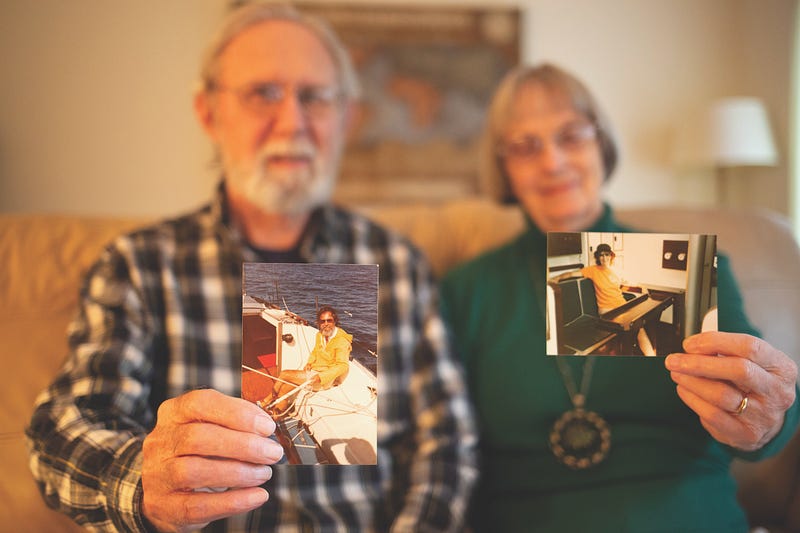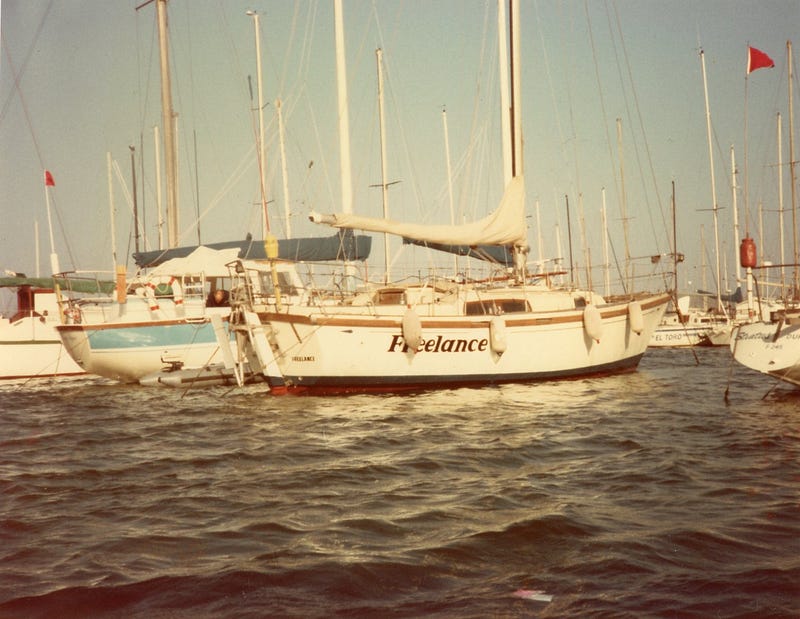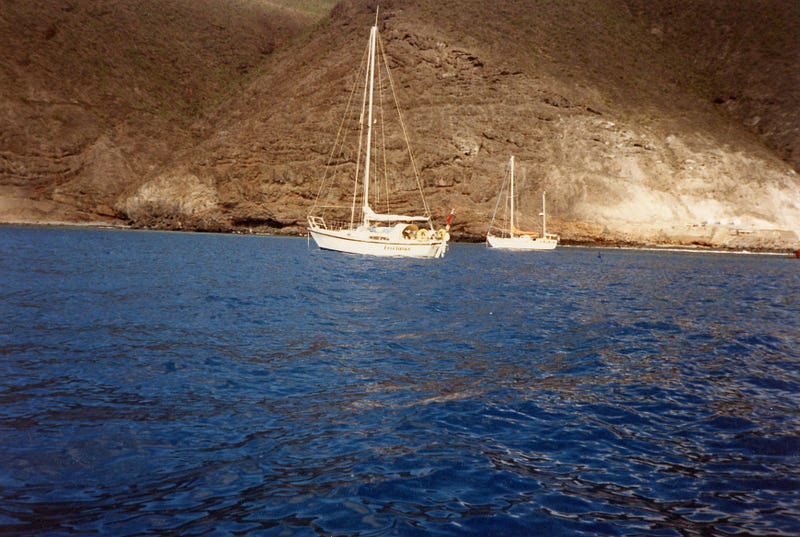Sailing to a new life
John and June Vigor set out on a six-month voyage to the U.S. after censorship and the inevitable expulsion of foreign journalists in South Africa.
Story by HAILEY PALMER & Photo by MATHEW ROLAND / Courtesy photos from JOHN AND JUNE VIGOR

The stars provided the only source of light in the moonless sky. John Vigor remembers it well.
“You wouldn’t believe the night sky out there,” John said. “You can put your hand over the deck and get a shadow from the stars. It’s not the same kind of shadow as the sun, but it’s there and you can see it. It’s quite extraordinary.”
It was one night of many on a six-month voyage he spent at sea with his wife, June, and their son, Kevin, sailing to the United States from Durban, South Africa in 1987. John recalls navigating their boat through pitch black darkness when clouds hid the moon and stars.
“Sailing across an ocean at night you can’t see anything ahead of you,” John said. “It’s like driving down a freeway blindfolded, and this goes on all night.”
John and June, originally from Britain and the United States respectively, worked as journalists in South Africa for 23 years before they boarded their 30-foot yacht and set sail. The country’s threat to expel foreign journalists was one of the reasons they decided to leave.
The couple had dreamt about crossing an ocean together.
“That was part of the thinking when it was time to go,” June said. “We would sail and get our ocean voyage in.”
June was a well-established, experienced journalist in South Africa, the editor-in-chief of one of the largest magazines in the country, but none of that seemed to matter once she and John had arrived to the United States.
“When we got to America she had to take a job for six bucks an hour because nobody in America grants you any favors or gives you any credit for overseas work,” John said. “They just look at you sideways here.”
John had a similar problem. In South Africa, he worked as a daily columnist, but in the U.S., he felt like he was starting from the bottom again. In St. George, Utah, one editor offered the both of them jobs for a combined total of $1,000 a month. At the time, they were nearly desperate enough to take it, John said.
The political climate in the South Africa was never really comfortable to begin with, which made the decision to leave easier, June said. Racial segregation and censorship from the South African government under the apartheid policies were prevalent during the ’80s, and June said that was when they knew it was right for them to leave.
“Our reason for being there was that we felt the independent newspapers and nongovernment newspapers were really the best thing that was going on to oppose the government,” June said. “As long as we had a part in that, we were contributing something, but if there was censorship and they were going to expel us anyway, it was time to go.”
The Vigors spent a few weeks getting everything ready for the six-month voyage. They cleared out the apartment they were living in and packed their furniture and other belongings into a shipping container to be sent off on a cargo ship. After that, they set off.

Sailing wasn’t new to John or June, but they had never crossed an ocean together. The next six months spent traveling to the United States would become what June said is the major adventure of her life.
John and June recall each and every detail of their voyage in a way that makes it seem like it happened 30 days ago, not 30 years ago. They tell the story slowly and carefully, without leaving out any details.
It’s a casual subject for them, as if packing up all of their belongings, hopping on a boat and sailing to another country over the course of six months was something people did at the time. It was normal to them. Many journalists they knew were in the same situation and also had to leave, they said.
The trip was initially supposed to end in Boston, where there were job opportunities, but John’s visa ran out. Afraid of being stopped in international waters without valid papers, they changed course and headed to Port Everglades, the nearest U.S. port, in Fort Lauderdale.
The Vigors wanted to be sure about the visa after an encounter on the way to Fort Lauderdale about 200 miles away from Puerto Rico. A U.S.warship called the USS Wainwright stopped them in the middle of the ocean and asked if they were carrying any guns or drugs on board. They weren’t, but John said they were scared anyway.
They were eventually set free by the U.S. officials after he told them he had a visa.
“I didn’t tell them it was expired,” he said.
John didn’t take June and their son on a trial run before the voyage because he was counting on them not knowing how much a small boat jerks around on open water.
“I knew if they weren’t committed they probably wouldn’t want to come with me,” John said. “By not having a trial, they were totally committed. They couldn’t get off. They couldn’t go anywhere. It was just, like it, love it and get on with it.”
One night, the boat rocked back and forth so much their belongings started flying out of the cupboards. John steered the boat while June and Kevin repeatedly got up to put things away.

While crossing an ocean on a 30-foot boat may seem daunting to many, June said she was more than confident in John to get them to their destination.
“People asked me when we were getting ready to go whether or not I was afraid,” June said. “I never ever felt afraid of leaving on a boat and being out there because John is so competent. I never felt that we were in any danger.”
Upon arriving in the U.S., the Vigors sold their boat, bought a Buick and started criss-crossing the States stopping at newspapers looking for work.
They eventually ended up in San Diego without any work so they bought a typewriter, took it home and started sending resumes to all of the surrounding newspapers.
Four months later, John got his foot in the door with the San Diego Union-Tribune after getting to know one of the secretaries.
“Secretaries know everything,” John said. “If you’re looking for a job, you gotta know the secretaries.”
The San Diego Union-Tribune had a job opening later on as an editorial writer and offered it to John. He said it was amazing to him, despite his lack of knowledge of U.S. politics.
June worked at a public relations agency, but their time in San Diego was short-lived because John got a job offer in Irvine as an editor at a boating magazine.
They continued to move their way up the West Coast once another job opportunity opened up in Oak Harbor, where they stayed for seven years.
John and June moved to Bellingham in 2001 where June worked at the Bellingham Herald for seven years. Today, she and John are both retired and continue to live in Bellingham, in a home decorated with nautical memorabilia. Looking back at it now, he said it’s hardly believable they accomplished such a thing. When people ask him now how he crossed the ocean on a 30-foot boat, he sometimes wonders himself.
